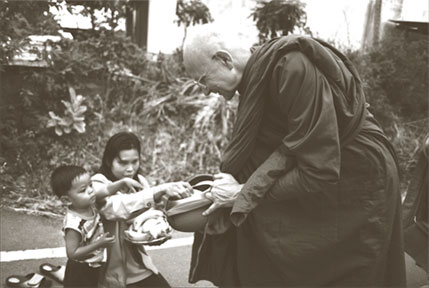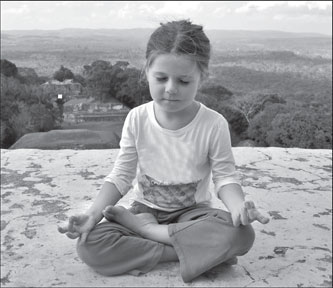Coming to grips with Buddhist ethics
By Lionel Wijesiri
Modern research in the mainstream of philosophy and psychology in the
Western world has begun to appreciate the impact of Buddhist ethical
discourse on topics such as the nature of people, freedom, attention
training and emotional regulation. The growth of Buddhist ethics as a
discipline has also led Western teachers and practitioners of Buddhism
to apply its tenets to contemporary issues and problems.
 |
|
To those who live in South East Asia,
where the teachings of the Buddha have been long
established, the sight of a Bhikkhu collecting alms in the
early morning is common. |
Buddhist ethics evolve around three main concepts and these are Sila,
Samadhi and Panna.
* Sila - Ethical conduct comprising Right speech (samma vaca), Right
action (samma kammanta) and Right livelihood (samma ajiva)
* Samadhi - Concentration comprises Right effort (samma vayama),
Right mindfulness (samma sati) and Right collectedness (samma samadhi)
* Panna - Insight comprises Right understanding (samma ditthi) and
Right thinking (samma sankappa)
Even these three aspects of the path, although identified separately
for clarification, are not separate. In practice, with proper
understanding, sila, samadhi and panna are assimilated in each moment,
in every thought, word or deed.
For instance, how does one refrain from wrong speech and action?
First of all, what is right speech and wrong speech? Are they not
relative to time, place and person? Is there such a thing as absolute
right and absolute wrong? We can go on and on without coming to a
definite conclusion, and by so doing, we veer away from ourselves - that
is, from our minds.
Restraint
The purpose of sila is to refrain from hurting others by way of
harmful speech and action - but how much restraint can we impose on
ourselves at all times? We react to our environment in such a habitual
way that we may already have hurt others before we realise what has
happened in the mind.
This is because we are conditioned to neglect our own minds in daily
life. Our attention is almost always directed outward. This
preoccupation with the outer world is what we have to transcend.
Although we are dealing with verbal and physical acts, all of these
originate from the mind itself. The actions of the mind, speech and body
occur in such rapid succession that there seems to be no interval in
between. As soon as a thought has arisen, we find ourselves speaking or
doing something. We find that we cannot control speech and bodily
behaviour fast enough to refrain from harmful speech and action.
Sila
Sila in Buddhism is one of the three sections of the Noble Eight-fold
Path, and is a code of conduct that embraces a commitment to harmony and
self-restraint with the principal motivation being non-violence or
freedom from causing harm.
It is an internal and intentional ethical behaviour, according to
one’s commitment to the path of liberation. The Sanskrit and Pali word
sila is an ethical compass within self and relationships, rather than
what is associated with the English word ‘morality’ (i.e., obedience, a
sense of obligation and external constraint - all of which are quite
foreign to the concept of sila as taught by the Buddha).
Sila is also wholehearted commitment to what is wholesome. Two
aspects of sila are essential to the training: Right ‘performance’
(caritta) and right ‘avoidance’ (varitta). Honouring the precepts of
sila is considered a ‘great gift’ (maha dana) to others, because it
creates an atmosphere of trust, respect and security. It means we pose
no threat to another person’s life, property, family, rights or
well-being.
Samadhi
Samadhi is the ‘one-pointedness of the mind’. It is the concentration
of the mind on one object to the exclusion of all irrelevant matter.
There are different subjects for meditation according to the
temperaments of the individual. Concentration on respiration is the
easiest to gain the one-pointedness of the mind.
Meditation on loving-kindness is very beneficial as it is conducive
to mental peace and happiness. Cultivation of the four sublime states:
Loving-kindness (Metta), compassion (Karuna), sympathetic joy (Mudita)
and equanimity (Upekkha) are highly commendable.
After giving careful consideration to the subject for contemplation,
we should choose the one most suited to our temperament. This being
satisfactorily settled, we make a persistent effort to focus our mind
until we become so wholly absorbed and interested in it, that all other
thoughts get ipso facto, excluded from the mind. The five hindrances to
progress - namely, sense desire, hatred, sloth and torpor, restlessness
and brooding and doubts are then temporarily inhibited. Eventually we
become enwrapped in Jhana, enjoying the calmness and serenity of a
one-pointed mind.
 |
|
Samadhi can be
practised even by the young |
When we gain this perfect one-pointedness of the mind, it is possible
for us to develop the five Supernormal Powers (abhinna): Divine Eye
(dibbacakkhu), Divine Ear (dibbasota), Reminiscence of past births
(pubbenivasanussatinana), Thought-reading (paracitta vijanana) and
various psychic powers (iddhividha). Though the mind is now purified,
there still lies dormant in him the tendency to give vent to his
passions, for by samadhi, passions are lulled to sleep temporarily. They
may rise to the surface at unexpected moments.
Panna
Sila regulates words and deeds; Samadhi controls the mind; but it is
Panna (insight), the third and the final stage, that enables us to
eradicate wholly the defilements inhibited by Samadhi.
With our one-pointed mind which now resembles a polished mirror, we
look at the world to get a correct view of life. Wherever we turn our
eyes, we see the Three Characteristics - Anicca (transient), Dukkha
(sorrowful) and Anatta (soulless) standing out in bold relief. We
comprehend that life is constantly changing and all conditioned things
are transient. Neither in heaven nor on earth do we find any genuine
happiness, for every form of pleasure is a prelude to pain. What is
transient is therefore painful, and where change and sorrow prevail,
there cannot be a permanent immortal soul.
Whereupon, of these three characteristics, we choose one that appeals
to us most and intently keep on developing insight in that particular
direction until that glorious day comes to us when we would realise
Nibbana for the first time in our life, having destroyed the three
fetters - self-illusion (Sakkaya-ditthi), doubts (Vicikiccha),
indulgence in (wrongful) rites and ceremonies (Silabbataparamasa).
Now, encouraged by the unprecedented success of our endeavours, we
make our final advance and destroying the remaining fetters, namely:
Lust after life in Realms of Forms (Ruparaga) and Formless Realms
(Aruparaga), conceit (Mana), restlessness (Uddhacca) and ignorance
(Avijja), we become an Arahant, a Worthy One.
Instantly, we realise that what was to be accomplished has been done,
that a heavy burden of sorrow has been relinquished, that all forms of
attachment have been totally annihilated, and that the Path to Nibbana
has been trodden. We now stand on heights more than celestial, far
removed from the rebellious passions and defilements of the world,
realising the bliss of Nibbana. |


